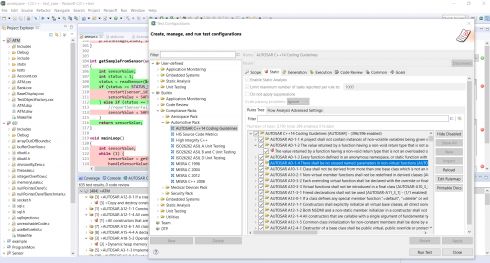
Automated software testing and application security company Parasoft released version 10.4.2 of its Parasoft C/C++test solution for embedded applications. The latest release introduces streamlined utilities for meeting the AUTOSAR C++ compliance for automotive and security standards, as well as performance and metric-tracking improvements.
According to the company, the primary focus of the release is to reduce the amount of manual labor involved with meeting coding standards as well providing a “complete solution for testing C and modern C++ code.”
This includes packaging in all of the rulesets for AUTOSAR C++ automotive and security standards, ready-made static analysis checkers and a dedicated module for generating compliance reports. These features join Parasoft C/C++test’s existing CERT C, CERT C++, UL 2900, and MISRA compliance tools.
“The most innovative software development teams across embedded industries are using more of the modern C++ language in their safety-critical designs, and the recent major update for the AUTOSAR C++ coding standard, along with its merger with MISRA, are focused on these safety-critical development teams,” Miroslaw Zielinski, product manager of Parasoft C/C++test, said in the announcement. “With our latest release, Parasoft is strengthening its leadership in the market of coding standards compliance, augmenting its comprehensive solution for security with the most complete solution for safety-critical C++ development.”
In addition to compliance features, Parasoft C/C++test 10.4.2 includes improved code-coverage metrics, which includes “simplified integration with build systems and enhancements to the Parasoft C/C++test coverage module to better support advanced coverage analysis required by safety standards, such as branch coverage, call-coverage, and MC/DC coverage,” as well as better performance during monitoring of pattern-based rules compliance, spurred by “the growing size of code bases and the increasing use of advanced build systems like Bazel, which heavily utilize team-wide caching and an incremental approach to building source code.”






